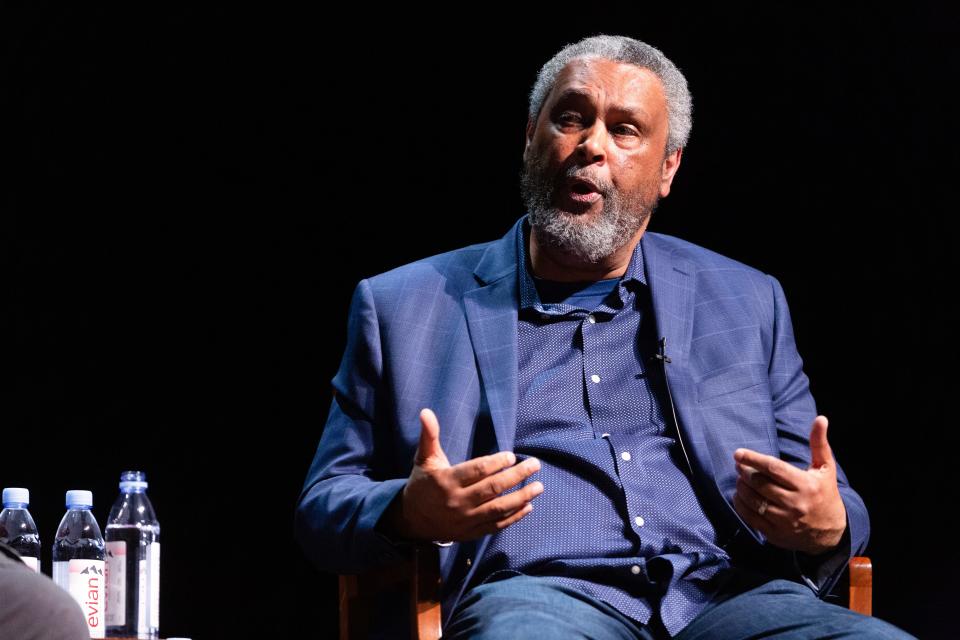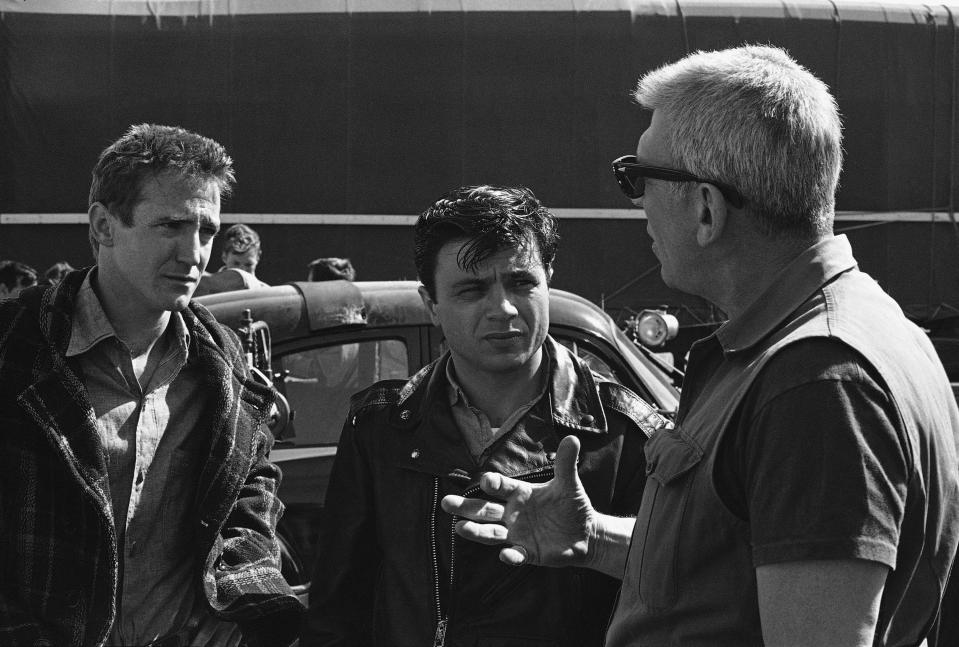Lights, cameras ... Kansas? State may revive tax credit, despite effectiveness concern.

On paper, Kevin Willmott and Hallmark movies are about as different as can be.
Willmott, a Kansas native and professor of film at the University of Kansas, won an Academy Award for his writing of the movie "BlacKkKlansman."
Hallmark Media, based within shouting distance of Kansas in Kansas City, has become infamous for its escapist, romantic comedy romps, often set in cozy, snowy small towns.
But both are united in support for Kansas reinstating a tax credit for TV and film productions, a move that supporters say is necessary to reignite the industry in the state.
Such a move would provide Willmott and Hallmark the potential inducement they need to film their flicks in Kansas. Willmott said it would come at a key time for the industry, which is increasingly moving out of Hollywood and using an array of locations for production.
"The film business has changed," he said, testifying before the Senate Commerce Committee earlier this month. "Movies are shot in the place with the best incentive because the film business, like any other business, is motivated first by profit."
But experts caution that film and TV tax credits, which have seen a renewed interest nationally, are an unwise way of stimulating economic development, pointing to lackluster returns in other states.
"There are concerns with the return on investment," said Gannon Evans, a policy analyst for the Kansas Policy Institute, a conservative think tank. "The people who are funding this credit are Kansas families and Kansas small businesses and they deserve a return on investment, too."
Bill to boost film production, improve media workforce

Kansas is one of 15 states that lacks a film and TV tax credit program, according to data from the National Conference of State Legislatures.
But that wasn't always the case. Prior to 2009, the state did have a tax credit program that enticed at least one of Willmott's movies, "The Only Good Indian," to film in the state.
The credit applied to up to 30% of all expenditures incurred while filming in the state, but lawmakers ditched the initiative as a way of balancing the budget in the wake of the Great Recession.
"Movies that were set in Kansas, movies about Kansas history, movies that could benefit and improve the lives of Kansans have gone to neighboring states or further away to Georgia, New Mexico and North Carolina," Willmott said. "That was attention and prestige that was meant for Kansas."
The HBO Max series "Somebody, Somewhere" is set in Manhattan but is filmed in Illinois for tax credit purposes. And the Kansas Department of Commerce says a filmmaker in Los Angeles has developed a script based on Hutchison's salt mines but is waiting on the state to approve credits in order to film in Kansas.
Now, a proposal in the Senate Commerce Committee is aimed at attempting to make up for lost time.
The 30% sales tax credit for eligible expenses related to the filming of a movie or TV show would return and could be expanded up to 40% if enough Kansas workers were used or the film was a blockbuster.
An income tax credit would also be ushered in for worker wages, provided at least 10% of the crew on a project were Kansas residents. The total credit would be capped at $10 million.
But officials are also looking at a series of grants, both for private companies and Kansas colleges and universities, designed to stimulate growth in media production.
Colleges could compete for $1 million in grants for internships, scholarship, loan forgiveness, equipment and programming expansion in film and TV studies, with an eye toward increasing workforce.
Justin Rorabaugh, director of Wichita State University’s School of Digital Arts, said the university was interested in the notion of creating degree programs in filmmaking, animation studies and other media-related professions when he approached them with the idea in 2017.
Initially, WSU set a goal of recruiting 65 students within five years. Instead, the program got nearly seven times as many people to enroll.
When he speaks with parents, Rorabaugh said the most common question he gets is whether a student can find gainful employment in Kansas after they graduate — something the bill would help address, he said.
"I think it is important we make Kansas a state people want to come to," Rorabaugh said. "Rather than a training ground that fosters really high-end creative talent and we send them away."
Do film and TV tax credits work? Many are skeptical.

Supporters of the idea routinely point to the example of Georgia, which has leveraged a generous tax credit program into a status in the film production industry rivaling that of Los Angeles and New York.
The film industry in the state generates over $2.8 billion in economic activity, something supporters chalk up to the robust tax credit which, unlike most states, is not capped.
But a 2020 report from the state's auditing arm found Georgia's economic development agency had overstated the economic benefits of the program for more than three decades. Much of the wages and jobs were held by out-of-state residents, though Kansas' program would require employment of in-state residents, while Georgia's does not.
A Massachusetts report reviewing that state's credit offerings found it cost $100,000 for each new job created, while tax revenues totaled only 14 cents for each dollar spent on incentives.
"We conclude that this is not the best use of the state’s money," the Massachusetts Tax Expenditure Review Commission wrote.
Meanwhile, the Kansas program — like those in most other states — are transferable and refundable. In effect, this means that if a company is set to receive a credit larger than its tax liability, the state will write it a check for the difference or the firm can sell it to someone else.
In Illinois, credits have been sold to a range of companies, from Comcast and Walmart to Oprah Winfrey.
This has engendered some skepticism from Kansas lawmakers about restarting its program — but others argue the impact on the state goes beyond tax revenue and could include new hospitality or film tourism opportunities generated locally.
"There is a lot more to the total picture than just taxes," said Sen. Mary Ware, D-Wichita.
Kansas and Missouri race to lay out film tax credit offerings

The efforts to pass the credit program in Kansas are complicated by the fact that Missouri, which does not currently have an incentive program, is considering creating one.
Hearings in Jefferson City last week examined a new credit program, which would be capped at $15 or $16 million.
Economic development officials in Kansas City say they will work with moviemakers to promote opportunities on both sides of the state line, though they caution that falling behind Missouri would be a big blow in those efforts.
But Sen. Renee Erickson, R-Wichita, chair of the Senate Commerce Committee, said "we don't want to do anything that would ramp up a border war with any of our neighbors."
That is a reference to what was a longstanding practice of using tax incentives to lure companies across the Kansas-Missouri border, even though they wouldn't ultimately create new in the Kansas City metro area. Gov. Laura Kelly and Missouri Gov. Mike Parson reached an agreement in 2019 to end the so-called border war.
Erickson said the committee would continue to review the bill — but also said she believed it was important that the state not fall behind its neighbors.
"I don't think it is any secret, I'm not a big fan of incentives," she said. "They are a reality I think we have to look at. Would I rather just have a broader tax base and not have incentives? Absolutely. But they are a reality and we have got to be sure we maximize the impact."
This article originally appeared on Topeka Capital-Journal: Kevin Willmott, Hallmark Channel encourage Kansas film tax credit
